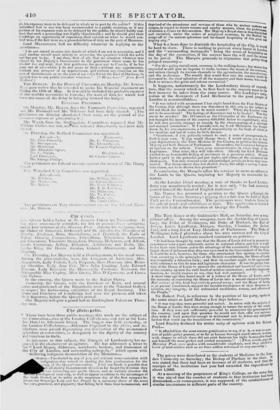The Tory dinner at the Goldsmith's Hall, on Saturday, was
a meg. nifieent affair. Among the company, were the Archbishop of Canter- bury, the Puke of Wellington, the Duke of Rutland, the Etat of Jersey, Lois Lyndhurst, Abinger, Stanley, Chandus, Sir Robert Peel, and a lung list of Tory Members of Parliament. The Duke of Wellington talked platitudes about his own services and the City of London. Lord Lyndhurst touched cautiously on politics-
" It had been thought by some that the House of Lords did not in present cit. cumstances take a part sufficiently active in national affairs, and that it would be for their own honour and to the advantage of the community if they soughtt larger share of influence titan they saw exercised in the Government of the Spite. It would be well, however, for those who entertained this opinion, to recollect that, according to the principles of the British constitution, the Housed Lurch was essentially a defensive body; and that its conduct ought to be appreciated with reference to this its true and legitimate character. It was the proper fano tion of the House of Lords to protect the established and beneficial institution' of the country against the rude hand of reckless innovation; and this imported function, ha might venture to say, they had well sustained. • ' ' A blunt time ago they heard much of a reform of the House of Lords, andel the necessity of converting the House of Lends into a second elective ber. But notion, of this kind lead entirely passed away ; and the House of Lords, as at presew constituted, enjoyed the suitable recompense of their fionness, re- solution, an I integrity, in the unbounded confidence, esteem, and affectiouof the People."
Sir Robert Peel, in reference to the position of his party, spoke in the same strain as Lord Mahon a few days before-
" It was true they were powerful and united. In union with the majority of the House of Lords, they were strong enough to insure the safety of the coonz tion. If they were not sufficiently powerful to administer the governaiest of the country, (and upon that question he would not then offer any opinion,) they were at least powerful enough to withstand and to defeat any utaligoaat faction that would sap the foundations of the constitution." Lord Stanley declared his entire unity of opinion with Sir Robed Peel- " It afforded him the most sincere gratification to say, ant thee was 00 ques- tion of public policy present, or so far as human foresight could extend, toeome, with respect to which there did not exist between his right honourable friend and himself the most perfect and cordial unattirnity'.' (These words, says the Morning Post, were spoken with considerable emphasis, and they elicited a burst of acclamation such as we hare seldom witnessed in any assembly.)


























 Previous page
Previous page